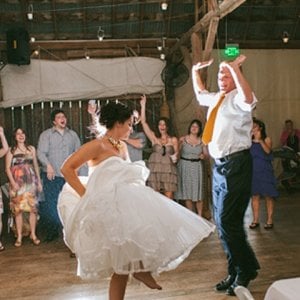Are your wedding plans being disrupted by parental bickering or step-parent stress? Here's how to keep your happy day from turning into a War of the Roses.
By: Eileen Livers
 |
When Robyn got engaged, her spirits were soaring. But then the 28-year-old store manager in Chicago remembered her parents' antics at her older brother's wedding, and her heart sank. At that ceremony, Robyn's mother refused at the last minute to escort her son down the aisle along with her ex-husband. "In frustration, my father grabbed his second wife from a pew and marched down with her," recalls Robyn. "The ceremony was delayed while my brother tried to get our mother, not to mention his bride, to stop crying."
Determined to keep her parents from ruining another wedding, Robyn and her husband eloped. Their ceremony was short and peaceful. "But," she admits, "I feel like I missed out on something really special."
It doesn't seem fair that the children of divorce often have two options—elope, or face an ugly situation, a dilemma that's increasingly common. "A lot of the young couples getting married today were born during the peak divorce period of the late '60s and early '70s, so there's a good chance that one or both sets of parents involved in many weddings are no longer together," explains Margorie Engel, author of Weddings: A Family Affair (Wilshire Publications, 1998).
While wedding experts say that getting to the altar can take a small miracle even when families are intact, they agree that having divorced parents tips the scales, especially since conventional wedding rules fail to offer applicable how-to solutions. "The emotional fallout of divorce has been well documented over the years," says Engel, "but the practical implications for family rituals has not."
Here Comes the Bride
Perhaps the most heart-wrenching decision a bride with divorced parents must make, according to Engel, is who will escort her down the aisle. When Laura, 30, an events coordinator in Newport Beach, California, was married two years ago, she found herself questioning her biological father's role at the wedding. "I kept thinking, He abandoned me and never kept in touch. Why should he get the honor of giving me away?"
Unfortunately, there's no easy answer. If you consider aisle-escorting an honor, says Engel, then you should bestow it on the person who has earned it. Ultimately, however, this decision is up to you—choose whoever makes you feel the most comfortable, be it two "fathers", your mother, the groom, or no one. The same spirit should apply to the traditional father-daughter first dance. Go with who seems most appropriate or simply skip this part—there are no "wedding police" lurking in the bushes.
Keep in mind, however, that "this is not the time to ‘get back' at a parent," warns Engel. "The purpose of a wedding is to create a new family, not destroy an old one." Engel suggests meeting privately with dad—and anyone else immediately involved—before you announce any decisions. "Open communication, right up front, is key," says Engel. "It will only make matters worse for you if family members have false expectations about your ceremony."
Laura eventually decided to ask both her biological father and mother to walk her down the aisle because she sensed that excluding her father wouldn't merely hurt his feelings, it would also cast a cloud on her special day—and hinder their chances of establishing a stronger relationship down the line.
"The decisions you make regarding your wedding set the tone for relationships afterward," explains Engel. "Consider your choices and motives carefully. You may still be hurt by your parents' divorce or furious at their actions, but if you can summon forgiveness, your wedding can be part of the family healing process."






